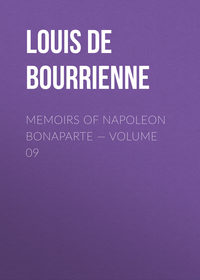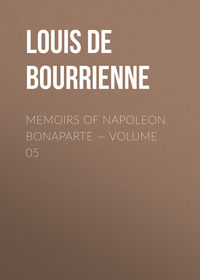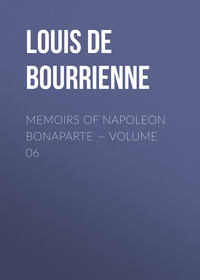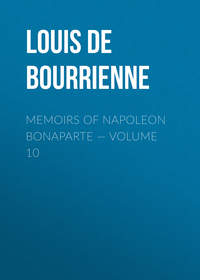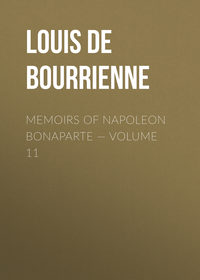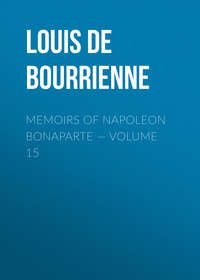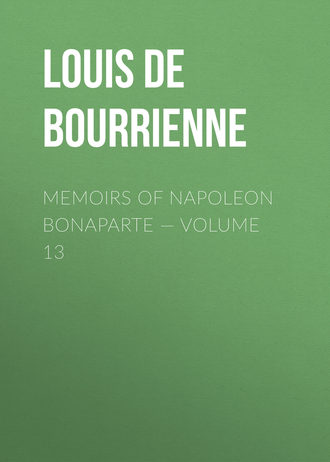 полная версия
полная версияMemoirs of Napoleon Bonaparte — Volume 13
Having had the opportunity of closely observing the machinery of a vigilant and active Government, I was, I must confess, not a little amazed at the insufficiency of the measures adopted to defeat this well- planned conspiracy. When M. de Blacas informed me of all that had been done, I could not repress an exclamation of surprise. "Well," said he, "and what would you have done?"—"In the first place I would not have lost twenty-four hours, which were an age in such a crisis." I then explained the plan I would have adopted. A quarter of an hour after the receipt of the letter I would have sent trustworthy men to Grenoble, and above all things I would have taken care not to let the matter fall into the hands of the police. Having obtained all information from the correspondent at Grenoble, I would have made him write a letter to his correspondent at Elba to quiet the eagerness of Napoleon, telling him that the movement of troops he spoke of had not been made, that it would take eight days to carry it out, and that it was necessary to the success of the enterprise to delay the embarkation for some days. While Bonaparte was thus delayed I would have sent to the coast of Provence a sufficient body of men devoted to the Royal cause, sending off in another direction the regiments whose chiefs were gained over by Napoleon, as the correspondence should reveal their names. "You are perhaps right, sir," said M. de Blacas, "but what could I do? I am new here. I had not the control of the police, and I trusted to M. d'Andre."—" Well," said I, "Bonaparte will be here on the 20th of March." With these words I parted from M. de Blacas. I remarked a great change in him. He had already lost a vast deal of that hauteur of favouritism which made him so much disliked.
When I entered upon my duties in the Prefecture of Police the evil was already past remedy. The incorrigible emigres required another lesson, and the temporary resurrection of the Empire was inevitable. But, if Bonaparte was recalled, it was not owing to any attachment to him personally; it was not from any fidelity to the recollections of the Empire. It was resolved at any price to get rid of those imbecile councillors, who thought they might treat France like a country conquered by the emigrants. The people determined to free themselves from a Government which seemed resolved to trample on all that was dear to France. In this state of things some looked upon Bonaparte as a liberator, but the greater number regarded him as an instrument. In this last character he was viewed by the old Republicans, and by a new generation, who thought they caught a glimpse of liberty in promises, and Who were blind enough to believe that the idol of France would be restored by Napoleon.
In February 1815, while everything was preparing at Elba for the approaching departure of Napoleon, Murat applied to the Court of Vienna for leave to march through the Austrian Provinces of Upper Italy an army directed on France. It was on the 26th of the same month that Bonaparte escaped from Elba. These two facts were necessarily connected together, for, in spite of Murat's extravagant ideas, he never could have entertained the expectation of obliging the King of France, by the mere force of arms, to acknowledge his continued possession of the throne of Naples. Since the return of Louis XVIII. the Cabinet of the Tuileries had never regarded Murat in any other light than as a usurper, and I know from good authority that the French Plenipotentiaries at the Congress of Vienna were especially instructed to insist that the restoration of the throne of Naples in favour of the Bourbons of the Two Sicilies should be a consequence of the restoration of the throne of France. I also know that the proposition was firmly opposed on the part of Austria, who had always viewed with jealousy the occupation of three thrones of Europe by the single House of Bourbon.
According to information, for the authenticity of which I can vouch, the following were the plans which Napoleon conceived at Elba. Almost immediately after his arrival in France he was to order the Marshals on whom he could best rely to defend to the utmost the entrances to the French territory and the approaches to Paris, by pivoting on the triple line of fortresses which gird the north and east of France. Davoust was 'in petto' singled out for the defence of Paris. He, was to arm the inhabitants of the suburbs, and to have, besides, 20,000 men of the National Guard at his disposal. Napoleon, not being aware of the situation of the Allies, never supposed that they could concentrate their forces and march against him so speedily as they did. He hoped to take them by surprise, and defeat their projects, by making Murat march upon Milan, and by stirring up insurrections in Italy. The Po being once crossed, and Murat approaching the capital of Lombardy, Napoleon with the corps of Suchet, Brune, Grouchy, and Massena, augmented by troops sent, by forced marches, to Lyons, was to cross the Alps and revolutionise Piedmont. There, having recruited his army and joined the Neapolitans in Milan, he was to proclaim the independence of Italy, unite the whole country under a single chief, and then march at the head of 100,000 men on Vienna, by the Julian Alps, across which victory had conducted him in 1797. This was not all: numerous emissaries scattered through Poland and Hungary were to foment discord and raise the cry of liberty and independence, to alarm Russia and Austria. It must be confessed it would have been an extraordinary spectacle to see Napoleon giving liberty to Europe in revenge for not having succeeded in enslaving her.
By means of these bold manoeuvres and vast combinations Napoleon calculated that he would have the advantage of the initiative in military operations. Perhaps his genius was never more fully developed than in this vast conception. According to this plan he was to extend his operations over a line of 500 leagues, from Ostend to Vienna, by the Alps and Italy, to provide himself with immense resources of every kind, to prevent the Emperor of Austria from marching his troops against France, and probably force him to terminate a war from which the hereditary provinces would have exclusively suffered. Such was the bright prospect which presented itself to Napoleon when he stepped on board the vessel which was to convey him from Elba to France. But the mad precipitation of Murat put Europe on the alert, and the brilliant illusion vanished like a dream.
After being assured that all was tranquil, and that the Royal family was secure against every danger, I myself set out at four o'clock on the morning of the 20th of March, taking the road to Lille.—Nothing extraordinary occurred until I arrived at the post-office of Fins, in front of which were drawn up a great number of carriages, which had arrived before mine, and the owners of which, like myself, were impatiently waiting for horses. I soon observed that some one called the postmaster aside in a way which did not appear entirely devoid of mystery, and I acknowledge I felt some degree of alarm. I was in the room in which the travellers were waiting, and my attention was attracted by a large bill fixed against the wall. It was printed in French and Russian, and it proved to be the order of the day which I had been fortunate enough to obtain from the Emperor Alexander to exempt posthorses, etc., from the requisitions of the Allied troops.
I was standing looking at the bill when the postmaster came into the room and advanced towards me. "Sir," said he, "that is an order of the day which saved me from ruin."—"Then surely you would not harm the man by whom it is signed?"—"I know you, sir, I recognised you immediately. I saw you in Paris when you were Director of the Post-office, and you granted a just claim which I had upon you. I have now come to tell you that they are harnessing two horses to your calash, and you may set off at full speed." The worthy man had assigned to my use the only two horses at his disposal; his son performed the office of postilion, and I set off to the no small dissatisfaction of some of the travellers who had arrived before me, and who, perhaps, had as good reasons as I to avoid the presence of Napoleon.
We arrived at Lille at eleven o'clock on the night of the 21st. Here I encountered another vexation, though not of an alarming kind. The gates of the town were closed, and I was obliged to content myself with a miserable night's lodging in the suburb.
I entered Lille on the 22d, and Louis XVIII. arrived on the 23d. His Majesty also found the gates closed, and more than an hour elapsed before an order could be obtained for opening them, for the Duke of Orleans, who commanded the town, was inspecting the troops when his Majesty arrived. The King was perfectly well received at Lille. There indeed appeared some symptoms of defection, but it must be acknowledged that the officers of the old army had been so singularly sacrificed to the promotion of the returned emigrants that it was very natural the former should hail the return of the man who had so often led them to victory. I put up at the Hotel de Grand, certainly without forming any prognostic respecting the future residence of the King. When I saw his Majesty's retinue I went down and stood at the door of the hotel, where as soon as Louis XVIII. perceived me he distinguished me from among all the persons who were awaiting his arrival, and holding out his hand for me to kiss he said, "Follow me, M. de Bourrienne."
On entering the apartments prepared for him the King expressed to me his approval of my conduct since the Restoration, and especially during the short interval in which I had discharged the functions of Prefect of the Police. He did me the honour to invite me to breakfast with him. The conversation naturally turned on the events of the day, of which every one present spoke according to his hopes or fears. Observing that Louis XVIII. concurred in Berthier's discouraging view of affairs, I ventured to repeat what I had already said at the Tuileries, that, judging from the disposition of the sovereigns of Europe and the information which I had received, it appeared very probable that his Majesty would be again seated on his throne in three months. Berthier bit his nails as he did when he wanted to leave the army of Egypt and return to Paris to the object of his adoration. Berthier was not hopeful; he was always one of those men who have the least confidence and the most depression. I could perceive that the King regarded my observation as one of those compliments which he was accustomed to receive, and that he had no great confidence in the fulfilment of my prediction. However, wishing to seem to believe it, he said, what he had more than hinted before, "M. de Bourrienne, as long as I am King you shall be my Prefect of the Police."
It was the decided intention of Louis XVIII. to remain in France as long as he could, but the Napoleonic fever, which spread like an epidemic among the troops, had infected the garrison of Lille. Marshal Mortier, who commanded at Lille, and the Duke of Orleans, expressed to me their well-founded fears, and repeatedly recommended me to urge the King to quit Lille speedily, in order to avoid any fatal occurrence. During the two days I passed with his Majesty I entreated him to yield to the imperious circumstances in which he was placed. At length the King, with deep regret, consented to go, and I left Lille the day before that fixed for his Majesty's departure.
In September 1814 the King had appointed me charge d'affaires from France to Hamburg, but not having received orders to repair to my post I have not hitherto mentioned this nomination. However, when Louis XVIII. was on the point of leaving France he thought that my presence in Hamburg might be useful for the purpose of making him acquainted with all that might interest him in the north of Germany. But it was not there that danger was to be apprehended. There were two points to be watched—the headquarters of Napoleon and the King's Council at Ghent. I, however, lost no time in repairing to a city where I was sure of finding a great many friends. On passing through Brussels I alighted at the Hotel de Bellevue, where the Duc de Berri arrived shortly after me. His Royal Highness then invited me to breakfast with him, and conversed with me very confidentially. I afterwards continued my journey.
CHAPTER VI
1815.
Message to Madame de Bourrienne on the 20th of March — Napoleon's nocturnal entrance into Paris — General Becton sent to my family by Caulaincourt—Recollection of old persecutions — General Driesen — Solution of an enigma— Seals placed on my effects — Useless searches — Persecution of women — Madame de Stael and Madame de Recamier — Paris during the Hundred Days — The federates and patriotic songs — Declaration of the Plenipotentiaries at Vienna.
At Lille, and again at Hamburg, I received letters from my family, which I had looked for with great impatience. They contained particulars of what had occurred relative to me since Bonaparte's return to Paris. Two hours after my departure Madame de Bourrienne also left Paris, accompanied by her children, and proceeded to an asylum which had been offered her seven leagues from the capital. She left at my house in Paris her sister, two of her brothers, and her friend the Comtesse de Neuilly, who had resided with us since her return from the emigration.
On the very morning of my wife's departure (namely, the 20th of March) a person, with whom I had always been on terms of friendship, and who was entirely devoted to Bonaparte, sent to request that Madame de Bourrienne would call on him, as he wished to speak to her on most important and urgent business. My sister-in-law informed the messenger that my wife had left Paris, but, begging a friend to accompany her, she went herself to the individual, whose name will be probably guessed, though I do not mention it. The person who came with the message to my house put many questions to Madame de Bourrienne's sister respecting my absence, and advised her, above all things, to conjure me not to follow the King, observing that the cause of Louis XVIII. was utterly lost, and that I should do well to retire quietly to Burgundy, as there was no doubt of my obtaining the Emperor's pardon.
Nothing could be more gloomy than Bonaparte's entrance into Paris. He arrived at night in the midst of a thick fog. The streets were almost deserted, and a vague feeling of terror prevailed almost generally in the capital.
At nine o'clock on the same evening, the very hour of Bonaparte's arrival at the Tuileries, a lady, a friend, of my family, and whose son served in the Young Guard, called and requested to see Madame de Bourrienne. She refused to enter the house lest she should be seen, and my sister-in-law went down to the garden to speak to her without a light. This lady's brother had been on the preceding night to Fontainebleau to see Bonaparte, and he had directed his sister to desire me to remain in Paris, and to retain my post in the Prefecture of the Police, as I was sure of a full and complete pardon.
On the morning of the 21st General Becton, who has since been the victim of his mad enterprises, called at my house and requested to speak with me and Madame de Bourrienne. He was received by my wife's sister and brothers, and stated that he came from M. de Caulaincourt to renew the assurances of safety which had already been given to me. I was, I confess, very sensible of these proofs of friendship when they came to my knowledge, but I did not for a single moment repent the course I adopted. I could not forget the intrigues of which I had been the object since 1811, nor the continual threats of arrest which, during that year, had not left me a moment's quiet; and since I now revert to that time, I may take the opportunity of explaining how in 1814 I was made acquainted with the real causes of the persecution to which I had been a prey. A person, whose name prudence forbids me mentioning, communicated to me the following letter, the original copy of which is in my possession:
MONSIEUR LE DUC DE BASSANO—I send you some very important documents respecting the Sieur Bourrienne, and beg you will make me a confidential report on this affair. Keep these documents for yourself alone. This business demands the utmost secrecy. Everything induces me to believe that Bourrienne has carried a series of intrigues with London. Bring me the report on Thursday. I pray God, etc.
(Signed) NAPOLEON PARIS, 25th December 1811.I could now clearly perceive what to me had hitherto been enveloped in obscurity; but I was not, as yet, made acquainted with the documents mentioned in Napoleon's epistle. Still, however, the cause of his animosity was an enigma which I was unable to guess, but I obtained its solution some time afterwards.
General Driesen, who was the Governor of Mittau while Louis XVIII. resided in that town, came to Paris in 1814. I had been well acquainted with him in 1810 at Hamburg, where he lived for a considerable time. While at Mittau he conceived a chivalrous and enthusiastic friendship for the King of France. We were at first distrustful of each other, but afterwards the most intimate confidence arose between us. General Driesen looked forward with certainty to the return of the Bourbons to France, and in the course of our frequent conversations on his favourite theme he gradually threw off all reserve, and at length disclosed to me that he was maintaining a correspondence with the King.
He told me that he had sent to Hartwell several drafts of proclamations, with none of which, he said, the King was satisfied. On allowing me the copy of the last of these drafts I frankly told him that I was quite of the King's opinion as to its unfitness. I observed that if the King should one day return to France and act as the general advised he would not keep possession of his throne six months. Driesen then requested me to dictate a draft of a proclamation conformably with my ideas. This I consented to do on one condition, viz. that he would never mention my name in connection with the business, either in writing or conversation. General Driesen promised this, and then I dictated to him a draft which I would now candidly lay before the reader if I had a copy of it. I may add that in the different proclamations of Louis XVIII. I remarked several passages precisely corresponding with the draft I had dictated at Hamburg.
During the four years which intervened between my return to Paris and the downfall of the Empire it several times occurred to me that General Driesen had betrayed my secret, and on his very first visit to me after the Restoration, our conversation happening to turn on Hamburg, I asked him whether he had not disclosed what I wished him to conceal? "Well," said he, "there is no harm in telling the truth now. After you had left Hamburg the King wrote to me inquiring the name of the author of the last draft I had sent him, which was very different from all that had preceded it. I did not answer this question, but the King having repeated it in a second letter, and having demanded an answer, I was compelled to break my promise to you, and I put into the post-office of Gothenberg in Sweden a letter for the King, in which I mentioned your name."
The mystery was now revealed to me. I clearly saw what had excited in Napoleon's mind the suspicion that I was carrying on intrigues with England. I have no doubt as to the way in which the affair came to his knowledge. The King must have disclosed my name to one of those persons whose situations placed them above the suspicion of any betrayal of confidence, and thus the circumstance must have reached the ear of Bonaparte. This is not a mere hypothesis, for I well know how promptly and faithfully Napoleon was informed of all that was said and done at Hartwell.
Having shown General Drieaen Napoleon's accusatory letter, he begged that I would entrust him with it for a day or two, saying he would show it to the King at a private audience. His object was to serve me, and to excite Louis XVIII.'s interest in my behalf, by briefly relating to him the whole affair. The general came to me on leaving tile Tuileries, and assured me that the King after perusing the letter, had the great kindness to observe that I might think myself very happy in not having been shot. I know not whether Napoleon was afterwards informed of the details of this affair, which certainly had no connection with any intrigues with England, and which, after all, would have been a mere peccadillo in comparison, with the conduct I thought it my duty to adopt at the time of the Restoration.
Meanwhile Madame de Bourrienne informed me by an express that seals were to be placed on the effects of all the persons included in the decree of Lyons, and consequently upon mine. As soon as my wife received information of this she quitted her retreat and repaired to Paris to face the storm. On the 29th of March, at nine in the evening, the police agents presented themselves at my house. Madame de Bourrienne remonstrated against the measure and the inconvenient hour that was chosen for its execution; but all was in vain, and there was no alternative but to submit.
But the matter did not end with the first formalities performed by Fouche's alguazils. During the month of May seven persons were appointed to examine, my papers, and among the inquisitorial septemvirate were two men well known and filling high situations. One of these executed his commission, but the other, sensible of the odium attached to it, wrote to say he was unwell, and never came. The number of my inquisitors, 'in domo', was thus reduced to six. They behaved with great rudeness, and executed their mission with a rigour and severity exceedingly painful to my family. They carried their search so far as to rummage the pockets of my old clothes, and even to unrip the linings. All this was done in the hope of finding something that would commit me in the eyes of the new master of France. But I was not to be caught in that way, and before leaving home I had taken such precautions as to set my mind perfectly at ease.
However, those who had declared themselves strongly against Napoleon were not the only persons who had reason to be alarmed at his return. Women even, by a system of inquisition unworthy of the Emperor, but unfortunately quite in unison with his hatred of all liberty, were condemned to exile, and had cause to apprehend further severity. It is for the exclusive admirers of the Chief of the Empire to approve of everything which proceeded from him, even his rigour against a defenceless sex; it is for them to laugh at the misery of a woman, and a writer of genius, condemned without any form of trial to the most severe punishment short of death. For my part, I saw neither justice nor pleasantry in the exile of Madame de Chevreuse for having had the courage (and courage was not common then even among men) to say that she was not made to be the gaoler of the Queen of Spain. On Napoleon's return from. the isle of Elba, Madame de Stael was in a state of weakness, which rendered her unable to bear any sudden and violent emotion. This debilitated state of health had been produced by her flight from Coppet to Russia immediately after the birth of the son who was the fruit of her marriage with M. Rocca. In spite of the danger of a journey in such circumstances she saw greater danger in staying where she was, and she set out on her new exile. That exile was not of long duration, but Madame de Stael never recovered from the effect of the alarm and fatigue it occasioned her.
The name of the authoress of Corinne, naturally calls to mind that of the friend who was most faithful to her in misfortune, and who was not herself screened from the severity of Napoleon by the just and universal admiration of which she was the object. In 1815 Madame Recamier did not leave Paris, to which she had returned in 1814, though her exile was not revoked. I know positively that Hortense assured her of the pleasure she would feel in receiving her, and that Madame Recamier, as an excuse for declining the perilous honour, observed that she had determined never again to appear in the world as long as her friends should be persecuted. The memorial de Sainte Helene, referring to the origin of the ill-will of the Chief of the Empire towards the society of Madame de Stael and Madame Recamier, etc., seems to reproach Madame Recamier, "accustomed," says the Memorial, "to ask for everything and to obtain everything," for having claimed nothing less than the complete reinstatement of her father. Whatever may have been the pretensions of Madame Recamier, Bonaparte, not a little addicted to the custom he complains of in her, could not have, with a good grace, made a crime of her ingratitude if he on his side had not claimed a very different sentiment from gratitude. I was with the First Consul at the time M. Bernard, the father of Madame Reamier, was accused, and I have not forgotten on what conditions the re-establishment would have been granted.


